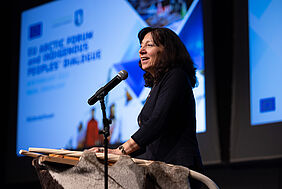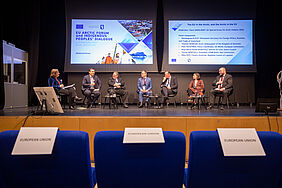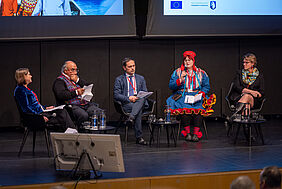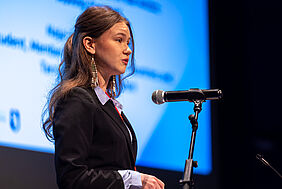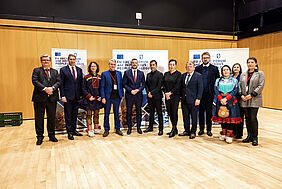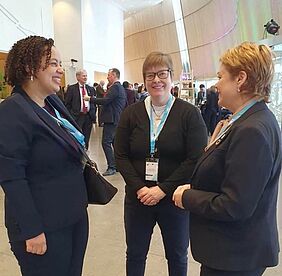The EU Arctic Forum is an annual event hosted by the European Commission which brings together high-level representatives from the European Commission, the EU External Action Service and a broad range of Arctic stakeholders, representing governments, international organisations, civil society, industry, research, indigenous and local communities, as well as youth.
The forum provided an opportunity to assess recent developments in the Arctic and to discuss challenges ahead. The Indigenous Peoples’ Dialogue offered a platform for discussion on Arctic matters affecting Indigenous Peoples.
The main threat to the Arctic is still climate change
In his opening remarks, EU Commissioner for Environment, Oceans and Fisheries, Mr Sinkevičius highlighted the importance of the Arctic for the European Union. In 2021, the EU updated its Arctic policy to preserve the Arctic as a region of peaceful cooperation, to slow down the effects of climate change, to support the sustainable development of Arctic regions and communities, and to include Indigenous Peoples and future generations in the dialogue.
Today, only over one year later, Commissioner Sinkevičius pointed out that despite the geopolitical developments, the most pressing issue in the Arctic is still climate change and it needs to be addressed through cooperation. “Resilient, sustainable and inclusive development can take place in the Arctic and we need to work together towards it, having in mind first and foremost the wellbeing of the people who live here today and tomorrow”.
The EU Arctic policy is instrumental to bring these objectives into reality and engage with indigenous peoples, women, and youth.
Cooperation in Interreg builds connections through solutions
The Arctic is diverse. Within its boundaries, it has diverse needs, experience, priorities. This diversity is seen as an added value that helps the Arctic to face some of the challenges that encounters. EU DG MARE Director-General Charlina Vitcheva pointed out that “the many challenges and opportunities are so interlinked, that many of these are best tackled, or can only be tackled, through coordination and very close cooperation at all levels. With the governments, with the regional authorities but also very much with the local community”. In the Arctic, “being different means that you can learn from each other”, and that is what the Arctic regions are doing – sharing knowledge, experience, and solutions to common problems.
In this context, the Interreg Aurora and Northern Periphery and Arctic programmes were mentioned as an example how the European Union through a bottom-up approach can foster knowledge sharing in the Arctic.
Mr Petri Koistinen, Policy Coordinator at European Commission DG REGIO shared the example of the NPA programme, which has for more than 20 years enabled communities across the Arctic to connect with each other and share knowledge and green solutions between them, as well as with the rest of Europe. “Regional development in the Arctic – continued Mr Koistinen – requires more funding, more investments, and more involvement of local communities. Local knowledge, local solutions and a culture of cooperation and trust between partners is what characterizes cooperation in the NPA and what can be brought across the EU”.
A sensitive and lasting Green Transition
When fostering dialogue and cooperation in the Arctic, the youth, Inuits, and Saami people shall have a say. Representatives of these three groups stressed the importance of not only being part of the dialogue, but also being part of the decision-making. These groups demand to be involved from the beginning, to ensure that the Green Transition will be fair, just, and take into consideration communities as well as indigenous peoples. Even more so today, as the Arctic is experiencing a rapid economic development.
With the energy crises, locally supplying energy resources and raw materials became a critical need. Essential resources are found in the Arctic, such as rare minerals, fish, and energy. For this reason, large scale companies are looking up North to invest in renewable energies, mining, or other industries related with green and digital transitions. This requires the careful work of balancing interests, taking into account not only environmental challenges, but also societal.
From a Sami perspective, Ms Silje Karine Muotka, President of Sámi Parliament of Norway, highlighted that although the green transition comes with benefits, there are also negative impacts related with it. In fact, many Sami communities feel that big (green) industrial projects come at an unfair and excessive cost to their lifestyle and territory, to which they have not consented. Ms Åsa Larsson Blind, Vice-President of the Saami Council, reminded the audience that in the process of striking the balance, it should be clearer that Sami are an indigenous people based on their territory, which is called Sápmi. Therefore, they should be understood as rightsholders, not stakeholders.
Among other challenges related with increased economic development in the Arctic, Mr Christian Keldsen from Greenland Business Association, mentioned that the jobs that the new industry is creating are not always compatible with local people skills and education, also because the population is small. Mr Keldsen believes that Greenland and the other Arctic regions need to consider what jobs they can offer to foreign workers, and for which ones they want to train their own people – especially the younger generation.
What Interreg programmes offer for a more inclusive Arctic partnership
The challenges and opportunities discussed during the EU Arctic Forum and Indigenous People Dialogue often touched on so called high-level politics. On the other hand, cooperation at the grass-root level was unquestionably seen as a key instrument. It is at this level of cooperation that Interreg programmes such as the NPA and Aurora allow people to work closely together on matters they have in common.
The NPA supports capacity building, knowledge sharing and innovative solution development between countries geographically far apart, but close in their daily experience of living in remote communities. The Interreg Aurora provides the same opportunities at immediate cross-border level, addressing two geographical sub-areas: Aurora and Sápmi. These programmes welcome project applications in line with the points discussed during this two-day event. Interested organisations are encouraged to contact the programme Secretariats.
Photo credit and copyrights: EU ARCTIC FORUM and INDIGENOUS PEOPLES’ DIALOGUE, 2023


